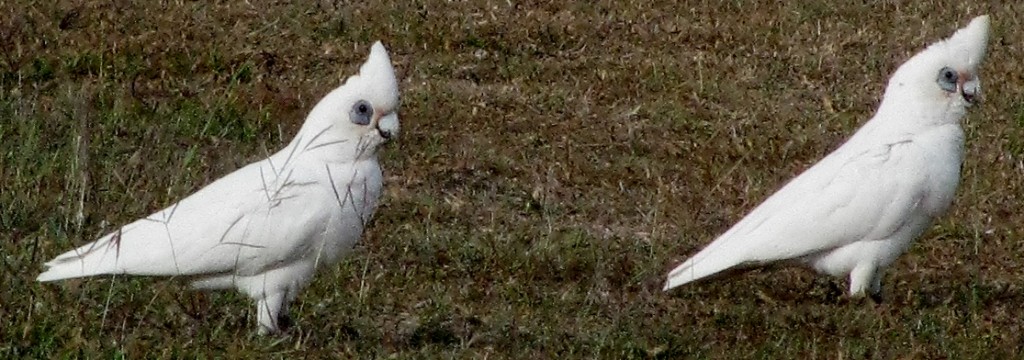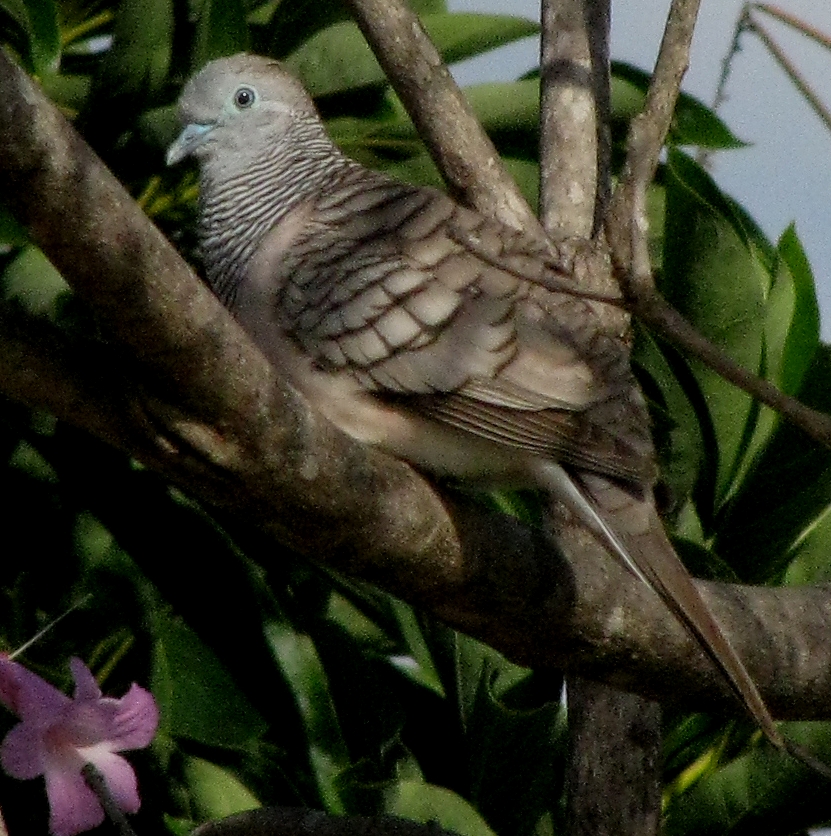I am very myopic, but yesterday morning I went walking in the Ross River Parkway without my glasses. Why? Because I was, quite truthfully, tired of looking for birds. In particular, I was tired of looking for new species. I figured the only way I’d have a peaceful walk was if I couldn’t see anything clearly, because that would eliminate the pressure to identify everything in sight. (I write this while watching a female yellow-bellied sunbird pluck beakfuls of spider web from the fence separating our yard from the neighbour’s.)
The absence of clear vision did preclude birdwatching, but it didn’t preclude birdlistening. I enjoy learning to recognize bird vocalizations and was surprised and mildly impressed by the number of species I was able to identify even when I couldn’t see them. The white-gaped honeyeater always gives itself away with its stuttering “p-p-p-p-pwee,” while the brown honeyeater comes across like a know-it-all with its scoffing chatter and assertive, ringing notes. Peaceful doves are the soothers of the bird world, crooning their soft “doodle-doo’s” intermixed with slightly more emphatic “crrrooooo’s.” The magpie-lark’s strident alarm call is a dead giveaway, as is the Australian magpie’s minor-chord carolling. Blue-faced honeyeaters are forever asking “kweep?” in throaty voices, while rainbow lorikeets are in your face with their pirate squawks. And so, the list goes on. Being able to identify birds by voice is not only satisfying, it’s also immensely useful even when one has glasses on and is actually looking for birds.
All the posts I’ve published regarding birds and birding might lead you to believe that I’m a twitcher. A twitcher is a birder, birdwatcher, or (in Australia) birdo who is obsessed with ticking off new species on his or her bird checklist. I am not a twitcher. I simply enjoy birds and like to learn about them, which usually includes as a first step, identification. Believe me, no twitcher who happens to be myopic would go walking without his/her glasses in order to get away from looking at birds.
Although I’m not a twitcher, I’m enjoying reading Sean Dooley’s book titled The Big Twitch, in which the author, a proud and determined Aussie twitcher, pursued his goal (and succeeded, although I haven’t finished the book yet) of identifying over 700 species of Australian birds in a calendar year. The year was 2002, and Dooley spent his inheritance chasing his dream of not only beating the previous record of 633 species, but eclipsing the 700 species tally (his total was 703). This dream, of course, entailed flying and driving up, down, and across the country in various seasons, as well as booking boat trips from various locations spaced along Australia’s coastline in order to tick off those pesky pelagic species such as albatrosses, which a twitcher can’t see from land.
As a new-to-Australia birdo, my less lofty goal of observing approximately half the number of species Dooley spotted seems quite reasonable if not downright challenging, considering that I’m not single, I don’t have an inheritance to blow, and I don’t have twenty years of Australian birding experience. Also, I to like to throw some hiking in with the birding, rather than simply drive, spot, tick, drive. I have to say, though, that The Big Twitch is giving me some good ideas for birding hotspots to visit.

Little Corellas (© Magi Nams)
Today’s birds: mynas, magpie-larks, masked lapwings, bush stone-curlews, crested pigeon, white-gaped honeyeater, Australian white ibis, welcome swallows, sulphur-crested cockatoos, rainbow lorikeets, zebra finch, rufous-throated honeyeater, great bowerbirds, willie wagtails, peaceful doves, straw-necked ibis, yellow honeyeaters, house sparrows, Australian magpies, yellow-throated miner, black kite, nutmeg mannikins, blue-faced honeyeaters, brown honeyeaters, white-breasted woodswallows, white-bellied cuckoo-shrikes, little corellas, rainbow bee-eaters, magpie geese, Brahminy kite.

Peaceful Dove (© Magi Nams)


